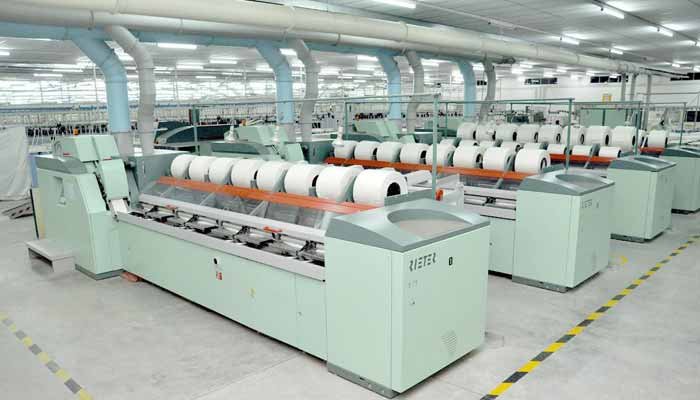Global shipment of new short-staple spindles and open-end rotors increased by +1.5 per cent and +13 per cent in 2018, respectively. The number of shipped draw-texturing spindles rose by +50 per cent and deliveries of shuttle-less looms improved by +39 per cent. Shipments of long-staple spindles, circular knitting machines, and electronic flat knitting machines decreased by -27 per cent, -4 per cent and -20 per cent, respectively. In the finishing segment, the sum of machines shipped worldwide in the category “fabric continuous” and “fabric discontinuous” fell by -0.5 per cent and -1.5 per cent year-on-year, respectively.
These are the main results of the 41th annual International Textile Machinery Shipment Statistics (ITMSS) just released by the International Textile Manufacturers Federation (ITMF). The report covers six segments of textile machinery, namely spinning, draw-texturing, weaving, large circular knitting, flat knitting and finishing. A summary of the findings for each category is presented below. The 2018 survey has been compiled in cooperation with more than 200 textile machinery manufacturers representing a comprehensive measure of world production.
Spinning machinery
The total number of shipped short-staple spindles increased by about 126,000 units to a level of 8.66 mn. Shipments increased for the second consecutive year, but the global trend slowed down. Most of the new short-staple spindles (92 per cent) were shipped to Asia & Oceania where delivery decreased by -2 per cent. The most dynamic destinations recorded in 2018 were Korea, Rep, Turkey, Vietnam and Egypt with increases of +834 per cent, +306 per cent, +290 per cent, +285 per cent, respectively. The six largest investors in the short-staple segment were China, India, Uzbekistan, Vietnam, Bangladesh, and Indonesia.
Global shipments of long-staple (wool) spindles decreased from 165,000 in 2017 to nearly 120,000 in 2018. This effect was mainly driven by a drop in deliveries to Asia & Oceania (-48,000 units). This region remained the strongest destination for this type of machinery but deliveries to China and Iran dropped by -60 per cent. The biggest investors were Turkey, Iran, China, Italy, and Vietnam.
721,000 open-end rotors were shipped worldwide in 2018. This represents an 83,000-units increase compared to 2017.91 per cent of global shipments went to Asia & Oceania where the share to total deliveries improved by +20 per cent to 658,000 rotors. However, China, the world’s largest investor in open-end rotors, increased its investments by +7 per cent in 2018 while deliveries to Thailand, Malaysia, and Egypt rose by over 3 times.
Texturing machinery
Global shipments of single heater draw-texturing spindles (mainly used for polyamide filaments) increased by +48 per cent from nearly 15,500 in 2017 to 22,800 in 2018. With a share of 91 per cent, Asia & Oceania was the strongest destination for single heater draw-texturing spindles. China and Japan were the main investors in this segment with a share of 68 per cent and 11 per cent of global deliveries, respectively.
In the category of double heater draw-texturing spindles (mainly used for polyester filaments) the positive trend continues and global shipments increased by +50 per cent on an annual basis to about 490,000 spindles. Asia’s share of worldwide shipments grew to 93 per cent. Thereby, China remained the largest investor accounting for 68 per cent of global shipments.
Weaving machinery
In 2018, worldwide shipments of shuttle-less looms increased by 39 per cent to 133,500 units. Thereby, shipments of air-jet and water-jet looms increased by +21 per cent to 32,750 and +91 per cent to 69,240, respectively. The deliveries of rapier/projectile looms dropped by -5 per cent to 31,560. The main destination for shuttle-less looms in 2018 was Asia & Oceania with 93 per cent of all worldwide deliveries. 92 per cent of all water-jet looms, 83 per cent of all rapier/projectile looms, and 99 per cent of all Air-jet looms went to that region. The main investors were China and India in all three categories. Deliveries of weaving machines to the two countries reached 81 per cent of total deliveries. Turkey and Bangladesh further played an important role in the rapier/projectile segment with a combined 18 per cent of global shipments.
Circular & flat knitting machinery
Global shipments of large circular knitting machines fell by 4 per cent to 26,300 units in 2018. Asia & Oceania was also the world’s leading investor in this category with 85 per cent of all new circular knitting machines shipped to the region. With 48 per cent of worldwide deliveries, China was the largest investor. India and Vietnam ranked second and third with 2,680 and 1,440 units, respectively.
In 2018, the segment of electronic flat knitting machines decreased by -20 per cent to around 160,000 machines. Asia & Oceania was the main destination for these machines with a share of 95 per cent of world shipments. China remained the world’s largest investor. The country kept its global share of 86 per cent of worldwide shipments despite a decrease in investments from 154,850 units to 122,550 units.
Finishing machinery
In the segment of fabrics continuous, shipments of Washing (stand-alone), Singeing line, Relax Dryers/Tumblers, Stenters, and Sanforizers/Compacters increased in 2018 by +58 per cent, +20 per cent, +9 per cent, +3 per cent, and +1 per cent, respectively. Deliveries in the other sub-segments decreased. In the category “fabrics discontinuous,” shipments of Air-jet dyeing machines increased by +16 per cent and deliveries of Overflow dyeing and Jigger dyeing/Beam dyeing machines fell by -7 per cent and -19 per cent respectively.























